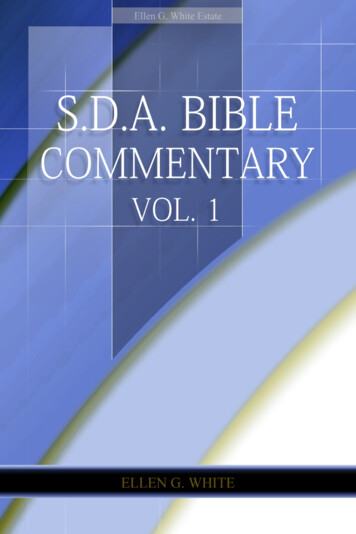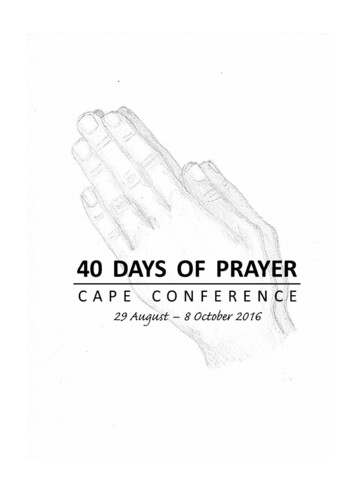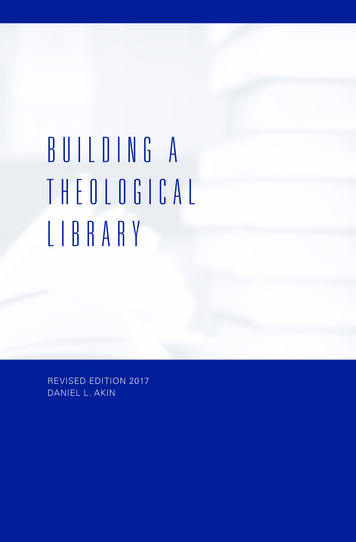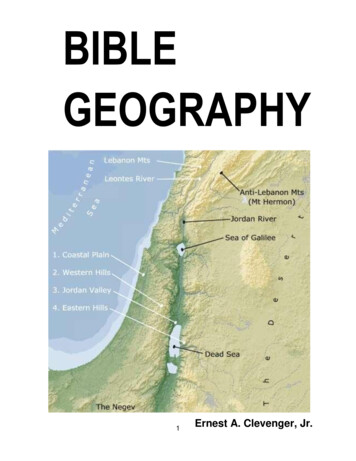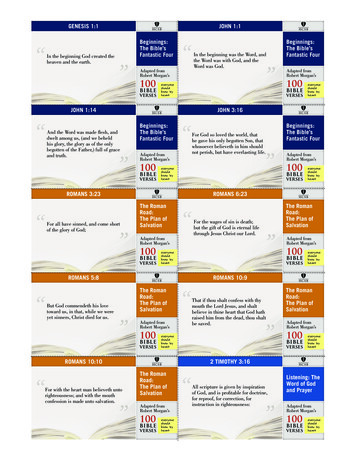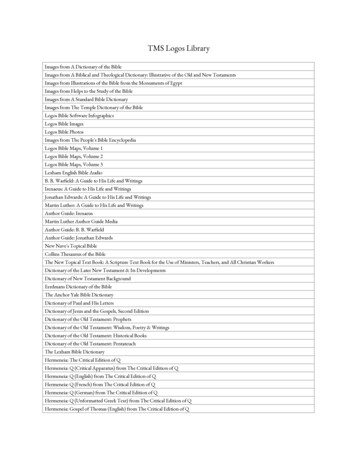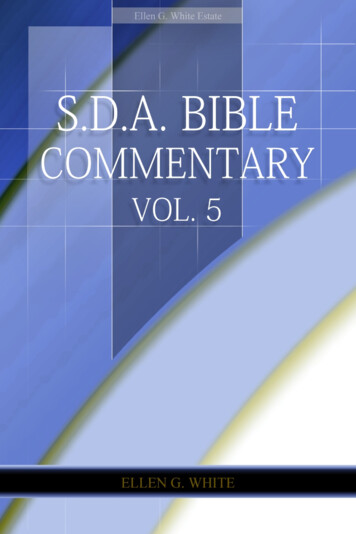
Transcription
S.D.A. BibleCommentary Vol. 5Ellen G. White1956Copyright 2017Ellen G. White Estate, Inc.
Information about this BookOverviewThis eBook is provided by the Ellen G. White Estate. It is includedin the larger free Online Books collection on the Ellen G. WhiteEstate Web site.About the AuthorEllen G. White (1827-1915) is considered the most widely translatedAmerican author, her works having been published in more than 160languages. She wrote more than 100,000 pages on a wide variety ofspiritual and practical topics. Guided by the Holy Spirit, she exaltedJesus and pointed to the Scriptures as the basis of one’s faith.Further LinksA Brief Biography of Ellen G. WhiteAbout the Ellen G. White EstateEnd User License AgreementThe viewing, printing or downloading of this book grants you onlya limited, nonexclusive and nontransferable license for use solelyby you for your own personal use. This license does not permitrepublication, distribution, assignment, sublicense, sale, preparationof derivative works, or other use. Any unauthorized use of this bookterminates the license granted hereby.Further InformationFor more information about the author, publishers, or how youcan support this service, please contact the Ellen G. White Estateat mail@whiteestate.org. We are thankful for your interest andfeedback and wish you God’s blessing as you read.i
ii
ContentsInformation about this Book . . . . . . . . . . . . . . . . . . . . . . . . . . . . iMatthew . . . . . . . . . . . . . . . . . . . . . . . . . . . . . . . . . . . . . . . . . . . . . viiChapter 2 . . . . . . . . . . . . . . . . . . . . . . . . . . . . . . . . . . . . . . . . . . . . 8Chapter 3 . . . . . . . . . . . . . . . . . . . . . . . . . . . . . . . . . . . . . . . . . . . . 9Chapter 4 . . . . . . . . . . . . . . . . . . . . . . . . . . . . . . . . . . . . . . . . . . 13Chapter 5 . . . . . . . . . . . . . . . . . . . . . . . . . . . . . . . . . . . . . . . . . . 22Chapter 6 . . . . . . . . . . . . . . . . . . . . . . . . . . . . . . . . . . . . . . . . . . 26Chapter 7 . . . . . . . . . . . . . . . . . . . . . . . . . . . . . . . . . . . . . . . . . . 29Chapter 9 . . . . . . . . . . . . . . . . . . . . . . . . . . . . . . . . . . . . . . . . . . . 31Chapter 10 . . . . . . . . . . . . . . . . . . . . . . . . . . . . . . . . . . . . . . . . . 34Chapter 11 . . . . . . . . . . . . . . . . . . . . . . . . . . . . . . . . . . . . . . . . . 35Chapter 12 . . . . . . . . . . . . . . . . . . . . . . . . . . . . . . . . . . . . . . . . . . 41Chapter 13 . . . . . . . . . . . . . . . . . . . . . . . . . . . . . . . . . . . . . . . . . 45Chapter 14 . . . . . . . . . . . . . . . . . . . . . . . . . . . . . . . . . . . . . . . . . . 47Chapter 15 . . . . . . . . . . . . . . . . . . . . . . . . . . . . . . . . . . . . . . . . . 48Chapter 16 . . . . . . . . . . . . . . . . . . . . . . . . . . . . . . . . . . . . . . . . . 49Chapter 17 . . . . . . . . . . . . . . . . . . . . . . . . . . . . . . . . . . . . . . . . . 52Chapter 18 . . . . . . . . . . . . . . . . . . . . . . . . . . . . . . . . . . . . . . . . . 53Chapter 19 . . . . . . . . . . . . . . . . . . . . . . . . . . . . . . . . . . . . . . . . . 54Chapter 20 . . . . . . . . . . . . . . . . . . . . . . . . . . . . . . . . . . . . . . . . . 55Chapter 21 . . . . . . . . . . . . . . . . . . . . . . . . . . . . . . . . . . . . . . . . . 56Chapter 22 . . . . . . . . . . . . . . . . . . . . . . . . . . . . . . . . . . . . . . . . . 58Chapter 23 . . . . . . . . . . . . . . . . . . . . . . . . . . . . . . . . . . . . . . . . . 59Chapter 24 . . . . . . . . . . . . . . . . . . . . . . . . . . . . . . . . . . . . . . . . . . 61Chapter 25 . . . . . . . . . . . . . . . . . . . . . . . . . . . . . . . . . . . . . . . . . 63Chapter 26 . . . . . . . . . . . . . . . . . . . . . . . . . . . . . . . . . . . . . . . . . 65Chapter 27 . . . . . . . . . . . . . . . . . . . . . . . . . . . . . . . . . . . . . . . . . 75Chapter 28 . . . . . . . . . . . . . . . . . . . . . . . . . . . . . . . . . . . . . . . . . 84Mark . . . . . . . . . . . . . . . . . . . . . . . . . . . . . . . . . . . . . . . . . . . . . . . . . 87Chapter 1 . . . . . . . . . . . . . . . . . . . . . . . . . . . . . . . . . . . . . . . . . . 88Chapter 2 . . . . . . . . . . . . . . . . . . . . . . . . . . . . . . . . . . . . . . . . . . 89Chapter 3 . . . . . . . . . . . . . . . . . . . . . . . . . . . . . . . . . . . . . . . . . . 90Chapter 4 . . . . . . . . . . . . . . . . . . . . . . . . . . . . . . . . . . . . . . . . . . . 91Chapter 6 . . . . . . . . . . . . . . . . . . . . . . . . . . . . . . . . . . . . . . . . . . 92iii
ivSDA Bible Commentary, vol. 5 (EGW)Chapter 8 . . . . . . . . . . . . . . . . . . . . . . . . . . . . . . . . . . . . . . . . . . 93Chapter 9 . . . . . . . . . . . . . . . . . . . . . . . . . . . . . . . . . . . . . . . . . . 94Chapter 10 . . . . . . . . . . . . . . . . . . . . . . . . . . . . . . . . . . . . . . . . . 95Chapter 11 . . . . . . . . . . . . . . . . . . . . . . . . . . . . . . . . . . . . . . . . . 96Chapter 12 . . . . . . . . . . . . . . . . . . . . . . . . . . . . . . . . . . . . . . . . . . 97Chapter 13 . . . . . . . . . . . . . . . . . . . . . . . . . . . . . . . . . . . . . . . . . 99Chapter 14 . . . . . . . . . . . . . . . . . . . . . . . . . . . . . . . . . . . . . . . . 100Chapter 15 . . . . . . . . . . . . . . . . . . . . . . . . . . . . . . . . . . . . . . . . 101Chapter 16 . . . . . . . . . . . . . . . . . . . . . . . . . . . . . . . . . . . . . . . . 102Luke . . . . . . . . . . . . . . . . . . . . . . . . . . . . . . . . . . . . . . . . . . . . . . . 105Chapter 1 . . . . . . . . . . . . . . . . . . . . . . . . . . . . . . . . . . . . . . . . . 106Chapter 2 . . . . . . . . . . . . . . . . . . . . . . . . . . . . . . . . . . . . . . . . . 109Chapter 3 . . . . . . . . . . . . . . . . . . . . . . . . . . . . . . . . . . . . . . . . . 116Chapter 4 . . . . . . . . . . . . . . . . . . . . . . . . . . . . . . . . . . . . . . . . . 117Chapter 5 . . . . . . . . . . . . . . . . . . . . . . . . . . . . . . . . . . . . . . . . . 119Chapter 6 . . . . . . . . . . . . . . . . . . . . . . . . . . . . . . . . . . . . . . . . . 120Chapter 7 . . . . . . . . . . . . . . . . . . . . . . . . . . . . . . . . . . . . . . . . . 121Chapter 8 . . . . . . . . . . . . . . . . . . . . . . . . . . . . . . . . . . . . . . . . . 122Chapter 9 . . . . . . . . . . . . . . . . . . . . . . . . . . . . . . . . . . . . . . . . . 123Chapter 10 . . . . . . . . . . . . . . . . . . . . . . . . . . . . . . . . . . . . . . . . 124Chapter 11 . . . . . . . . . . . . . . . . . . . . . . . . . . . . . . . . . . . . . . . . 125Chapter 12 . . . . . . . . . . . . . . . . . . . . . . . . . . . . . . . . . . . . . . . . 126Chapter 13 . . . . . . . . . . . . . . . . . . . . . . . . . . . . . . . . . . . . . . . . 128Chapter 14 . . . . . . . . . . . . . . . . . . . . . . . . . . . . . . . . . . . . . . . . 129Chapter 16 . . . . . . . . . . . . . . . . . . . . . . . . . . . . . . . . . . . . . . . . 130Chapter 17 . . . . . . . . . . . . . . . . . . . . . . . . . . . . . . . . . . . . . . . . 131Chapter 18 . . . . . . . . . . . . . . . . . . . . . . . . . . . . . . . . . . . . . . . . 133Chapter 19 . . . . . . . . . . . . . . . . . . . . . . . . . . . . . . . . . . . . . . . . 134Chapter 21 . . . . . . . . . . . . . . . . . . . . . . . . . . . . . . . . . . . . . . . . 135Chapter 22 . . . . . . . . . . . . . . . . . . . . . . . . . . . . . . . . . . . . . . . . 136Chapter 23 . . . . . . . . . . . . . . . . . . . . . . . . . . . . . . . . . . . . . . . . 139Chapter 24 . . . . . . . . . . . . . . . . . . . . . . . . . . . . . . . . . . . . . . . . 140John . . . . . . . . . . . . . . . . . . . . . . . . . . . . . . . . . . . . . . . . . . . . . . . 143Chapter 1 . . . . . . . . . . . . . . . . . . . . . . . . . . . . . . . . . . . . . . . . . 144Chapter 2 . . . . . . . . . . . . . . . . . . . . . . . . . . . . . . . . . . . . . . . . . 155Chapter 3 . . . . . . . . . . . . . . . . . . . . . . . . . . . . . . . . . . . . . . . . . 156Chapter 4 . . . . . . . . . . . . . . . . . . . . . . . . . . . . . . . . . . . . . . . . . 159Chapter 5 . . . . . . . . . . . . . . . . . . . . . . . . . . . . . . . . . . . . . . . . . 161
ContentsChapter 6 . . . . . . . . . . . . . . . . . . . . . . . . . . . . . . . . . . . . . . . . .Chapter 7 . . . . . . . . . . . . . . . . . . . . . . . . . . . . . . . . . . . . . . . . .Chapter 8 . . . . . . . . . . . . . . . . . . . . . . . . . . . . . . . . . . . . . . . . .Chapter 10 . . . . . . . . . . . . . . . . . . . . . . . . . . . . . . . . . . . . . . . .Chapter 11 . . . . . . . . . . . . . . . . . . . . . . . . . . . . . . . . . . . . . . . .Chapter 12 . . . . . . . . . . . . . . . . . . . . . . . . . . . . . . . . . . . . . . . .Chapter 13 . . . . . . . . . . . . . . . . . . . . . . . . . . . . . . . . . . . . . . . .Chapter 14 . . . . . . . . . . . . . . . . . . . . . . . . . . . . . . . . . . . . . . . .Chapter 15 . . . . . . . . . . . . . . . . . . . . . . . . . . . . . . . . . . . . . . . .Chapter 16 . . . . . . . . . . . . . . . . . . . . . . . . . . . . . . . . . . . . . . . .Chapter 17 . . . . . . . . . . . . . . . . . . . . . . . . . . . . . . . . . . . . . . . .Chapter 18 . . . . . . . . . . . . . . . . . . . . . . . . . . . . . . . . . . . . . . . .Chapter 19 . . . . . . . . . . . . . . . . . . . . . . . . . . . . . . . . . . . . . . . .Chapter 20 . . . . . . . . . . . . . . . . . . . . . . . . . . . . . . . . . . . . . . . .Chapter 21 . . . . . . . . . . . . . . . . . . . . . . . . . . . . . . . . . . . . . . . .v163165167168169170173180183188189195196199202
viSDA Bible Commentary, vol. 5 (EGW)
Matthew
Chapter 21, 2. Attention Focused on Birth of Jesus—The Lord movedupon the wise men to go in search of Jesus, and He directed theircourse by a star. This star, leaving them when near Jerusalem, ledthem to make inquiries in Judah; for they thought it was not possiblefor the chief priests and scribes to be ignorant of this great event.The coming of the wise men made the whole nation acquaintedwith the object of their journey, and directed their attention to theimportant events which were transpiring (The Spirit of Prophecy2:26).16-18. Faithfulness Would Have Rendered Wrath Harmless—All this terrible calamity was suffered of God, to humblethe pride of the Jewish nation. Their crimes and wickedness hadbeen so great that the Lord permitted the wicked Herod to thus punish them. Had they been less boastful and ambitious, their livespure, their habits simple and sincere, God would have preservedthem from being thus humiliated and afflicted by their enemies. Godwould, in a signal manner, have made the wrath of the king harmlessto His people, had they been faithful and perfect before Him. But Hecould not especially work for them, for their works were abhorredby Him (The Spirit of Prophecy 2:28).8
Chapter 31-3. See EGW comment on Luke 1:76, 77.7, 8 (Luke 3:7-9). Who Were Vipers?—The Pharisees werevery strict in regard to the outward observance of forms and customs, and were filled with haughty, worldly, hypocritical self-righteousness. The Sadducees denied the resurrection of the dead andthe existence of angels, and were skeptical in regard to God. Thissect was largely composed of unworthy characters, many of whomwere licentious in their habits. By the word “vipers” John meantthose who were malignant and antagonistic, bitterly opposed to theexpressed will of God.John exhorted these men to “bring forth therefore fruits meetfor repentance.” That is, Show that you are converted, that yourcharacters are transformed. Neither words nor profession, butfruits—the forsaking of sins, and obedience to the commandmentsof God—show the reality of genuine repentance and true conversion(Manuscript 112, 1901).13-17 (Mark 1:9-11; Luke 3:21, 22; John 1:32, 33). Angelsand a Golden Dove—Jesus was our example in all things that pertain to life and godliness. He was baptized in Jordan, just as thosewho come to Him must be baptized. The heavenly angels were look- [1078]ing with intense interest upon the scene of the Saviour’s baptism,and could the eyes of those who were looking on, have been opened,they would have seen the heavenly host surrounding the Son of Godas He bowed on the banks of the Jordan. The Lord had promised togive John a sign whereby he might know who was the Messiah, andnow as Jesus went up out of the water, the promised sign was given;for he saw the heavens opened, and the Spirit of God, like a dove ofburnished gold, hovered over the head of Christ, and a voice camefrom heaven, saying, “This is my beloved Son, in whom I am wellpleased” (The Youth’s Instructor, June 23, 1892).(Romans 8:26; Hebrews 4:16.) Heaven Open to Petitions—[Matthew 3:13-17 quoted.] What does this scene mean to us? How9
10SDA Bible Commentary, vol. 5 (EGW)thoughtlessly we have read the account of the baptism of our Lord,not realizing that its significance was of the greatest importance to us,and that Christ was accepted of the Father in man’s behalf. As Jesusbowed on the banks of Jordan and offered up His petition, humanitywas presented to the Father by Him who had clothed His divinitywith humanity. Jesus offered Himself to the Father in man’s behalf,that those who had been separated from God through sin, mightbe brought back to God through the merits of the divine Petitioner.Because of sin the earth had been cut off from heaven, but with Hishuman arm Christ encircles the fallen race, and with His divine armHe grasps the throne of the Infinite, and earth is brought into favorwith heaven, and man into communion with his God. The prayerof Christ in behalf of lost humanity cleaved its way through everyshadow that Satan had cast between man and God, and left a clearchannel of communication to the very throne of glory. The gateswere left ajar, the heavens were opened, and the Spirit of God, inthe form of a dove, encircled the head of Christ, and the voice ofGod was heard saying, “This is my beloved Son, in whom I am wellpleased.”The voice of God was heard in answer to the petition of Christ,and this tells the sinner that his prayer will find a lodgment at thethrone of the Father. The Holy Spirit will be given to those who seekfor its power and grace, and will help our infirmities when we wouldhave audience with God. Heaven is open to our petitions, and we areinvited to come “boldly unto the throne of grace, that we may obtainmercy, and find grace to help in time of need.” We are to come infaith, believing that we shall obtain the very things we ask of Him(The Signs of the Times, April 18, 1892).The Sound of a Death Knell—When Christ presented Himselfto John for baptism, Satan was among the witnesses of that event.He saw the lightnings flash from the cloudless heavens. He heardthe majestic voice of Jehovah that resounded through heaven, andechoed through the earth like peals of thunder, announcing, “This ismy beloved Son, in whom I am well pleased.” He saw the brightnessof the Father’s glory overshadowing the form of Jesus, thus pointingout with unmistakable assurance the One in that crowd whom Heacknowledged as His Son. The circumstances connected with thisbaptismal scene were of the greatest interest to Satan. He knew
Chapter 311then for a certainty that unless he could overcome Christ, fromthenceforth there would be a limit to his power. He understood thatthis communication from the throne of God signified that heavenwas now more directly accessible to man than it had been, and themost intense hatred was aroused in his breast.When Satan led man to sin, he hoped that God’s abhorrence ofsin would forever separate Him from man, and break the connectinglink between heaven and earth. When from the opening heavenshe heard the voice of God addressing His Son, it was to him as thesound of a death knell. It told him that now God was about to uniteman more closely to Himself, and give moral power to overcometemptation, and to escape from the entanglements of satanic devices.Satan well knew the position which Christ had held in heaven as theSon of God, the Beloved of the Father; and that Christ should leavethe joy and honor of heaven, and come to this world as a man, filledhim with apprehension. He knew that this condescension on the partof the Son of God boded no good to him.The time had now come when Satan’s empire over the world [1079]was to be contested, his right disputed, and he feared that his powerwould be broken. He knew, through prophecy, that a Saviour waspredicted, and that His kingdom would not be established in earthlytriumph and with worldly honor and display. He knew that theprophecies foretold a kingdom to be established by the Prince ofheaven upon the earth which he claimed as his dominion. Thiskingdom would embrace all the kingdoms of the world, and thenthe power and glory of Satan would cease, and he would receivehis retribution for the sins he had introduced into the world, andfor the misery he had brought upon the human race. He knew thateverything which concerned his prosperity was depending upon hissuccess or failure in overcoming Christ with his temptations; andhe brought to bear on the Saviour every artifice at his command toallure Him from His integrity (The Signs of the Times, August 4,1887).16, 17 (Ephesians 1:6. See EGW comment on Matthew 4:111). A Pledge of Love and Light—In our behalf the Saviour laidhold of the power of Omnipotence, and as we pray to God, we mayknow that Christ’s prayer has ascended before, and that God hasheard and answered it. With all our sins and weaknesses we are not
12SDA Bible Commentary, vol. 5 (EGW)cast aside as worthless. “He hath made us accepted in the beloved.”The glory that rested upon Christ is a pledge of the love of God forus. It tells of the power of prayer,—how the human voice may reachthe ear of God, and our petitions find acceptance in the courts ofheaven. The light that fell from the open portals upon the head ofour Saviour, will fall upon us as we pray for help to resist temptation.The voice that spoke to Jesus says to every believing soul, “This ismy beloved child, in whom I am well pleased” (Manuscript 125,1902).Assurance of Acceptance—Through the gates ajar therestreamed bright beams of glory from the throne of Jehovah, andthis light shines even upon us. The assurance given to Christ is assurance to every repenting, believing, obedient child of God that heis accepted in the Beloved (The Signs of the Times, July 31, 1884).A Way Through the Dark Shadow—Christ’s prayer on thebanks of the Jordan includes every one who will believe in Him. Thepromise that you are accepted in the Beloved comes to you. Godsaid, “This is my beloved Son, in whom I am well pleased.” Thismeans that through the dark shadow which Satan has thrown athwartyour pathway Christ has cleaved the way for you to the throne ofthe infinite God. He has laid hold of almighty power, and you areaccepted in the Beloved (The General Conference Bulletin, April 4,1901).
Chapter 41, 2 (Exodus 34:28; Deuteronomy 9:9; Luke 4:2). Moses’Fasting Not Like Christ’s—In the wilderness of temptation Christwas without food forty days. Moses had, on especial occasions,been thus long without food. But he felt not the pangs of hunger. Hewas not tempted and harassed by a vile and powerful foe, as was theSon of God. He was elevated above the human. He was especiallysustained by the glory of God which enshrouded him (The Signs ofthe Times, July 28, 1874).1-4 (Luke 4:1-4). The Power of Debased Appetite—All waslost when Adam yielded to the power of appetite. The Redeemer, inwhom was united both the human and the divine, stood in Adam’splace, and endured a terrible fast of nearly six weeks. The length ofthis fast is the strongest evidence of the extent of the sinfulness andpower of debased appetite upon the human family (The Review andHerald, August 4, 1874).A Lesson to Take to Ourselves—Christ was our example in allthings. As we see His humiliation in the long trial and fast in thewilderness to overcome the temptations of appetite in our behalf, weare to take this lesson home to ourselves when we are tempted. Ifthe power of appetite is so strong upon the human family, and itsindulgence so fearful that the Son of God subjected Himself to sucha test, how important that we feel the necessity of having appetiteunder the control of reason. Our Saviour fasted nearly six weeks,that He might gain for man the victory upon the point of appetite.How can professed Christians with an enlightened conscience, andChrist before them as their pattern, yield to the indulgence of thoseappetites which have an enervating influence upon the mind and [1080]heart? It is a painful fact that habits of self-gratification at theexpense of health, and the weakening of moral power, are holding inthe bonds of slavery at the present time a large share of the Christianworld.13
14SDA Bible Commentary, vol. 5 (EGW)Many who profess godliness do not inquire into the reason ofChrist’s long period of fasting and suffering in the wilderness. Hisanguish was not so much from enduring the pangs of hunger asfrom His sense of the fearful result of the indulgence of appetite andpassion upon the race. He knew that appetite would be man’s idol,and would lead him to forget God, and would stand directly in theway of his salvation (The Review and Herald, September 1, 1874).Satan Attacks at Weakest Moment—While in the wilderness,Christ fasted, but He was insensible to hunger. Engaged in constantprayer to His Father for a preparation to resist the adversary, Christdid not feel the pangs of hunger. He spent the time in earnest prayer,shut in with God. It was as if He were in the presence of His Father.He sought for strength to meet the foe, for the assurance that Hewould receive grace to carry out all that He had undertaken in behalfof humanity. The thought of the warfare before Him made Himoblivious to all else, and His soul was fed with the bread of life, justas today those tempted souls will be fed who go to God for aid. Heate of the truth which He was to give to the people as having powerto deliver them from Satan’s temptations. He saw the breakingof Satan’s power over fallen and tempted ones. He saw Himselfhealing the sick, comforting the hopeless, cheering the desponding,and preaching the gospel to the poor,—doing the work that God hadoutlined for Him; and He did not realize any sense of hunger untilthe forty days of His fast were ended.The vision passed away, and then, with strong craving Christ’shuman nature called for food. Now was Satan’s opportunity to makehis assault. He resolved to appear as one of the angels of light thathad appeared to Christ in His vision (Letter 159, 1903).The Trial Not Diminished—Christ knew that His Father wouldsupply Him food when it would gratify Him to do so. He would notin this severe ordeal, when hunger pressed Him beyond measure,prematurely diminish one particle of the trial allotted to Him byexercising His divine power.Fallen man, when brought into straightened places, could nothave the power to work miracles on his own behalf, to save himselffrom pain or anguish, or to give himself victory over his enemies. Itwas the purpose of God to test and prove the race, and give them anopportunity to develop character by bringing them frequently into
Chapter 415trying positions to test their faith and confidence in His love andpower. The life of Christ was a perfect pattern. He was ever, by Hisexample and precept, teaching man that God was his dependence,and that in God should be his faith and firm trust (The Review andHerald, August 18, 1874).1-11 (Mark 1:12, 13; Luke 4:1-13; see EGW comment onJohn 2:1, 2). The Whole Energies of Apostasy Rallied—In thecouncils of Satan it was determined that He [Christ] must be overcome. No human being had come into the world and escaped thepower of the deceiver. The whole forces of the confederacy of evilwere set upon His track to engage in warfare against Him, and ifpossible to prevail over Him. The fiercest and most inveterate enmitywas put between the seed of the woman and the serpent. The serpenthimself made Christ the mark of every weapon of hell.The life of Christ was a perpetual warfare against satanic agencies. Satan rallied the whole energies of apostasy against the Sonof God. The conflict increased in fierceness and malignity, as againand again the prey was taken out of his hands. Satan assailed Christthrough every conceivable form of temptation (The Review andHerald, October 29, 1895).No Failure on Even One Point—Christ passed from this sceneof glory [His baptism] to one of the greatest temptation. He wentinto the wilderness, and there Satan met Him, and tempted Himon the very points where man will be tempted. Our Substitute andSurety passed over the ground where Adam stumbled and fell. And [1081]the question was, Will He stumble and fall as Adam did over God’scommandments? He met Satan’s attacks again and again with, “It iswritten,” and Satan left the field of conflict a conquered foe. Christhas redeemed Adam’s disgraceful fall, and has perfected a characterof perfect obedience, and left an example for the human family, thatthey may imitate the Pattern. Had He failed on one point in referenceto the law of God, He would not have been a perfect offering; for itwas on one point only that Adam failed (The Review and Herald,June 10, 1890).Satan’s Lies to Christ—Satan told Christ that He was only toset His feet in the blood-stained path, but not to travel it. LikeAbraham He was tested to show His perfect obedience. He alsostated that he was the angel that stayed the hand of Abraham as the
16SDA Bible Commentary, vol. 5 (EGW)knife was raised to slay Isaac, and he had now come to save His life;that it was not necessary for Him to endure the painful hunger anddeath from starvation; he would help Him bear a part of the work inthe plan of salvation (The Review and Herald, August 4, 1874).(Matthew 3:16, 17; Mark 1:10, 11; Luke 3:21, 22.) PreciousTokens Showing Approval—Christ did not appear to notice thereviling taunts of Satan. He was not provoked to give him proofs ofHis power. He meekly bore his insults without retaliation. The wordsspoken from heaven at His baptism were very precious, evidencingto Him that His Father approved the steps He was taking in the planof salvation as man’s substitute and surety. The opening heavens,and descent of the heavenly dove, were assurances that His Fatherwould unite His power in heaven with that of His Son upon the earth,to rescue man from the control of Satan, and that God accepted theeffort of Christ to link earth to heaven, and finite man to the Infinite.These tokens, received from His Father, were inexpressibly precious to the Son of God through all His severe sufferings, and terribleconflict with the rebel chief (The Review and Herald, August 18,1874).(Genesis 3:1-6.) Satan Powerless to Hypnotize Christ—Satan tempted the first Adam in Eden, and Adam reasoned with theenemy, thus giving him the advantage. Satan exercised his power ofhypnotism over Adam and Eve, and this power he strove to exerciseover Christ. But after the word of Scripture was quoted, Satan knewthat he had no chance of triumphing (Letter 159, 1903).(Romans 5:12-19; 1 Corinthians 15:22, 45; 2 Corinthians5:21; Hebrews 2:14-18; 4:15.) The Two Adams Contrasted—When Adam was assailed by the tempter in Eden he was without thetaint of sin. He stood in the strength of his perfection before God.All the organs and faculties of his being were equally developed,and harmoniously balanced.Christ, in the wilderness of temptation, stood in Adam’s place tobear the test he failed to endure. Here Christ overcame in the sinner’sbehalf, four thousand years after Adam turned his back upon thelight of his home. Separated from the presence of God, the humanfamily had been departing every successive generation, farther fromthe original purity, wisdom, and knowledge which Adam possessedin Eden. Christ bore the sins and infirmities of the race as they
Chapter 417existed when He came to the earth to help man. In behalf of therace, with the weaknesses of fallen man upon Him, He was to standthe temptations of Satan upon all points wherewith man would beassailed.In what contrast is the second Adam as He entered the gloomywilderness to cope with Satan single-handed. Since the fall the racehad been decreasing in size and physical strength, and sinking lowerin the scale of moral worth, up to the period of Christ’s advent tothe earth. And in order to elevate fallen man, Christ must reachhim where he was. He took human nature, and bore the infirmitiesand degeneracy of the race. He, who knew no sin, became sin forus. He humiliated Himself to the lowest depths of human woe, thatHe might be qualified to reach man, and bring him up from thedegradation in which sin had plunged him (The Review and Herald,July 28, 1874).The Severest Discipline—To keep His glory veiled as the childof a fallen race, this was the most severe discipline to which thePrince of life could subject Himself. Thus He measured His strengthwith Satan. He who had been expelled from heaven fought desper- [1082]ately for the mastery over the One of whom in the courts above hehad been jealous. What a battle was this! No language is adequateto describe it. But in the near future it will be understood by thosewho have overcome by the blood of the Lamb and the word of theirtestimony (Letter 19, 1901).(Hebrews 2:14-18; 4:15; 2 Peter 1:4.) The Power That ManMay Command—The Son of God was assaulted at every step bythe powers of darkness. After His baptism He was driven of theSpirit into the wilderness, and suffered temptation for forty days.Letters have been coming in to me, affirming that Christ could nothave had the same nature as man, for if He had, He would havefallen under similar
John exhorted these men to "bring forth therefore fruits meet for repentance." That is, Show that you are converted, that your . 10 SDA Bible Commentary, vol. 5 (EGW) thoughtlessly we have read the account of the baptism of our Lord, not realizing that its significance was of the greatest importance to us,
